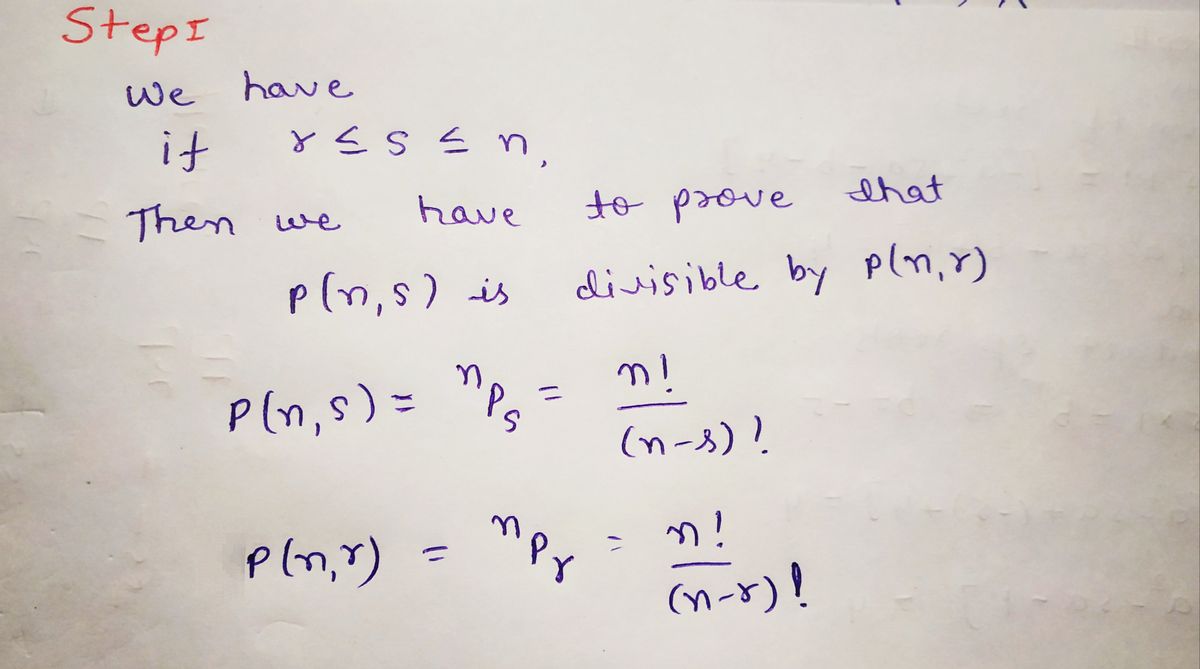Algebra and Trigonometry (6th Edition)
6th Edition
ISBN:9780134463216
Author:Robert F. Blitzer
Publisher:Robert F. Blitzer
ChapterP: Prerequisites: Fundamental Concepts Of Algebra
Section: Chapter Questions
Problem 1MCCP: In Exercises 1-25, simplify the given expression or perform the indicated operation (and simplify,...
Related questions
Question
![**Title: Permutations and Divisibility**
**Objective:**
Prove that if \( r \leq s \leq n \), then \( P(n, s) \) is divisible by \( P(n, r) \).
----
**Explanation:**
The problem involves proving a property related to permutations. Here, \( P(n, s) \) represents the number of permutations of \( n \) items taken \( s \) at a time. Similarly, \( P(n, r) \) represents permutations of \( n \) items taken \( r \) at a time.
**Steps to Approach the Proof:**
1. **Understand Permutations:**
- The formula for permutations \( P(n, k) \) is given by:
\[
P(n, k) = \frac{n!}{(n-k)!}
\]
- This formula represents selecting \( k \) items from \( n \) without replacement and considering the order.
2. **Divisibility Condition:**
- To prove that \( P(n, s) \) is divisible by \( P(n, r) \), show that:
\[
\frac{P(n, s)}{P(n, r)}
\]
is an integer.
3. **Simplifying the Expressions:**
- Write the expressions for \( P(n, s) \) and \( P(n, r) \):
\[
P(n, s) = \frac{n!}{(n-s)!}
\]
\[
P(n, r) = \frac{n!}{(n-r)!}
\]
- Compute the ratio:
\[
\frac{P(n, s)}{P(n, r)} = \frac{(n-r)!}{(n-s)!}
\]
4. **Prove the Ratio is Integer:**
- Note that since \( r \leq s \), each step from \( (n-r)! \) to \( (n-s)! \) is a product of consecutive integers:
\[
(n-s+1)(n-s+2)\cdots(n-r)
\]
- The product is clearly an integer, confirming divisibility.
This completes the proof that \( P(n, s) \) is divisible by \( P(n, r) \) under the given conditions.](/v2/_next/image?url=https%3A%2F%2Fcontent.bartleby.com%2Fqna-images%2Fquestion%2Fb48054c1-c883-40e2-8364-5c805e917eb2%2F66b02d4b-a13f-424b-978e-2f2a8c84a7af%2Fqvub9al_processed.jpeg&w=3840&q=75)
Transcribed Image Text:**Title: Permutations and Divisibility**
**Objective:**
Prove that if \( r \leq s \leq n \), then \( P(n, s) \) is divisible by \( P(n, r) \).
----
**Explanation:**
The problem involves proving a property related to permutations. Here, \( P(n, s) \) represents the number of permutations of \( n \) items taken \( s \) at a time. Similarly, \( P(n, r) \) represents permutations of \( n \) items taken \( r \) at a time.
**Steps to Approach the Proof:**
1. **Understand Permutations:**
- The formula for permutations \( P(n, k) \) is given by:
\[
P(n, k) = \frac{n!}{(n-k)!}
\]
- This formula represents selecting \( k \) items from \( n \) without replacement and considering the order.
2. **Divisibility Condition:**
- To prove that \( P(n, s) \) is divisible by \( P(n, r) \), show that:
\[
\frac{P(n, s)}{P(n, r)}
\]
is an integer.
3. **Simplifying the Expressions:**
- Write the expressions for \( P(n, s) \) and \( P(n, r) \):
\[
P(n, s) = \frac{n!}{(n-s)!}
\]
\[
P(n, r) = \frac{n!}{(n-r)!}
\]
- Compute the ratio:
\[
\frac{P(n, s)}{P(n, r)} = \frac{(n-r)!}{(n-s)!}
\]
4. **Prove the Ratio is Integer:**
- Note that since \( r \leq s \), each step from \( (n-r)! \) to \( (n-s)! \) is a product of consecutive integers:
\[
(n-s+1)(n-s+2)\cdots(n-r)
\]
- The product is clearly an integer, confirming divisibility.
This completes the proof that \( P(n, s) \) is divisible by \( P(n, r) \) under the given conditions.
Expert Solution
Step 1

Step by step
Solved in 2 steps with 2 images

Recommended textbooks for you

Algebra and Trigonometry (6th Edition)
Algebra
ISBN:
9780134463216
Author:
Robert F. Blitzer
Publisher:
PEARSON

Contemporary Abstract Algebra
Algebra
ISBN:
9781305657960
Author:
Joseph Gallian
Publisher:
Cengage Learning

Linear Algebra: A Modern Introduction
Algebra
ISBN:
9781285463247
Author:
David Poole
Publisher:
Cengage Learning

Algebra and Trigonometry (6th Edition)
Algebra
ISBN:
9780134463216
Author:
Robert F. Blitzer
Publisher:
PEARSON

Contemporary Abstract Algebra
Algebra
ISBN:
9781305657960
Author:
Joseph Gallian
Publisher:
Cengage Learning

Linear Algebra: A Modern Introduction
Algebra
ISBN:
9781285463247
Author:
David Poole
Publisher:
Cengage Learning

Algebra And Trigonometry (11th Edition)
Algebra
ISBN:
9780135163078
Author:
Michael Sullivan
Publisher:
PEARSON

Introduction to Linear Algebra, Fifth Edition
Algebra
ISBN:
9780980232776
Author:
Gilbert Strang
Publisher:
Wellesley-Cambridge Press

College Algebra (Collegiate Math)
Algebra
ISBN:
9780077836344
Author:
Julie Miller, Donna Gerken
Publisher:
McGraw-Hill Education